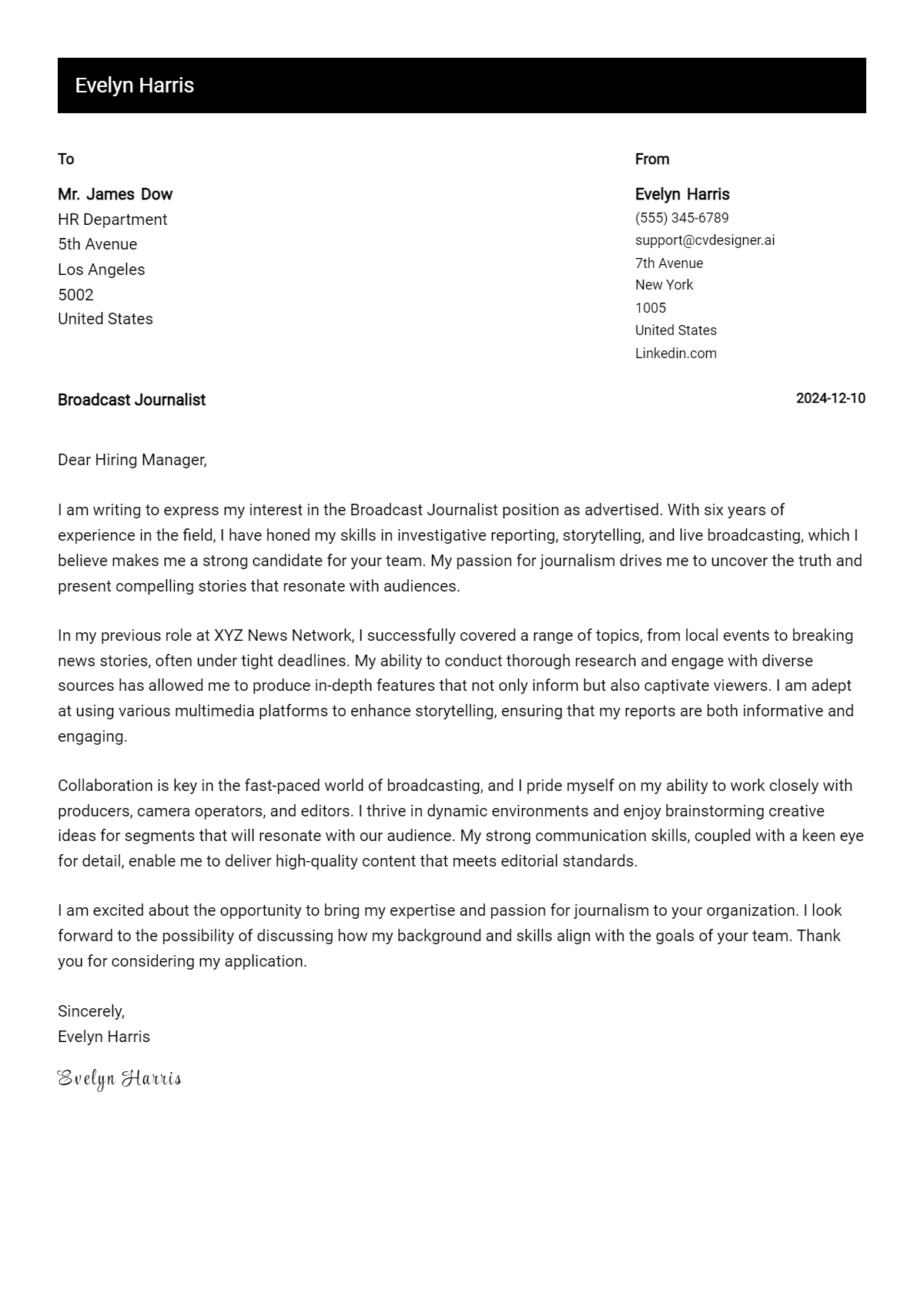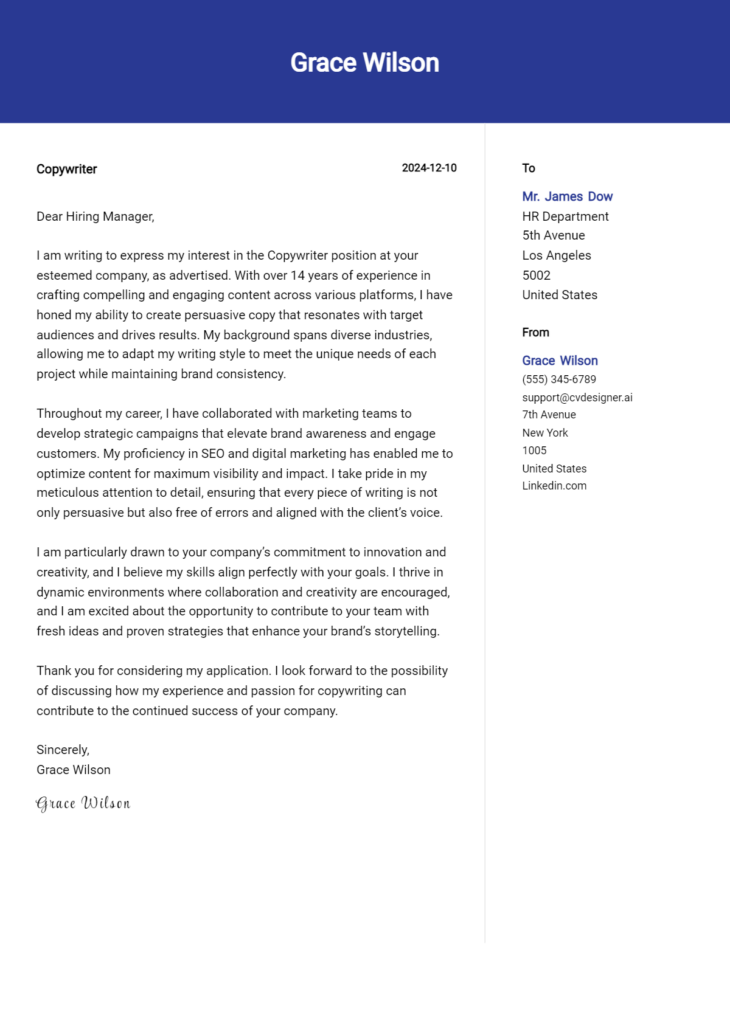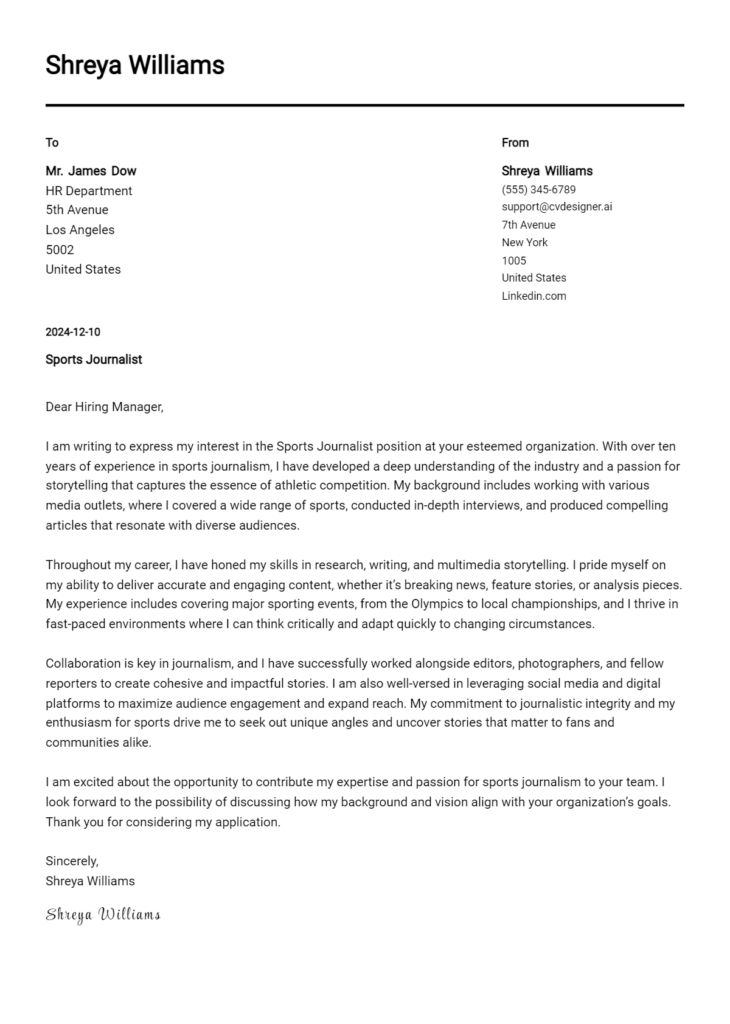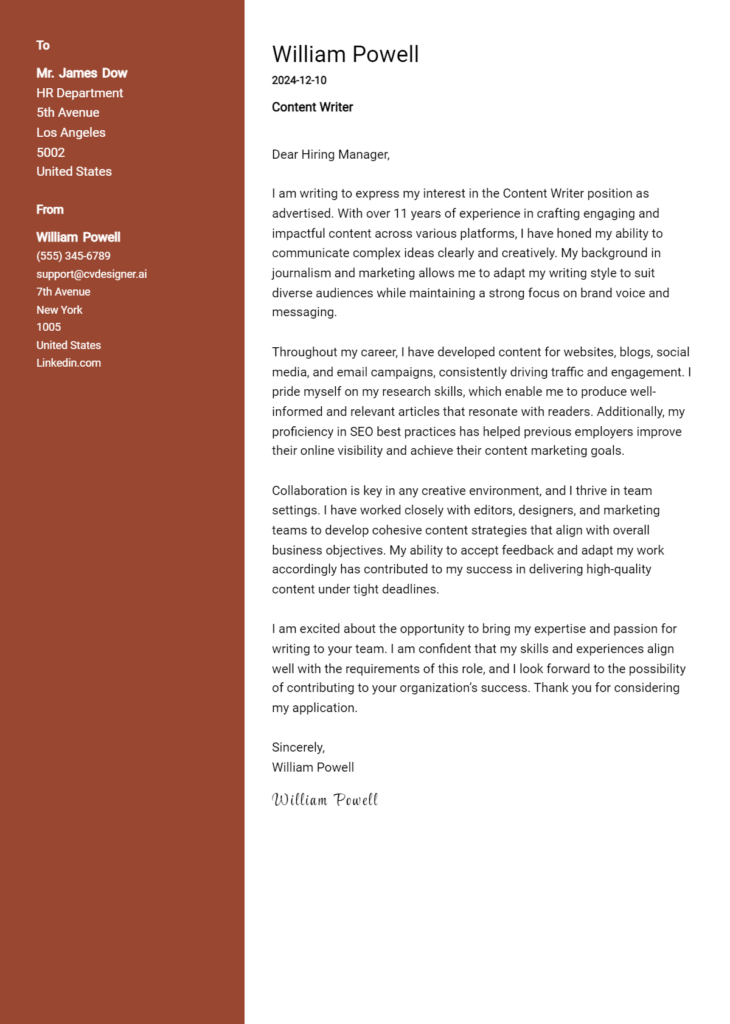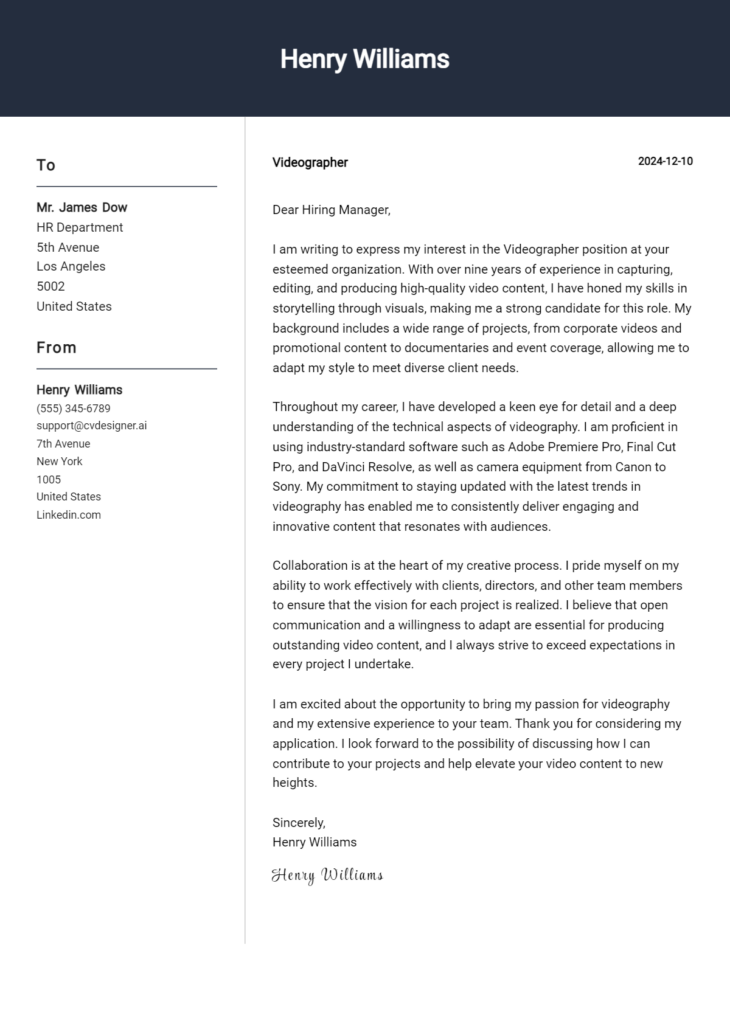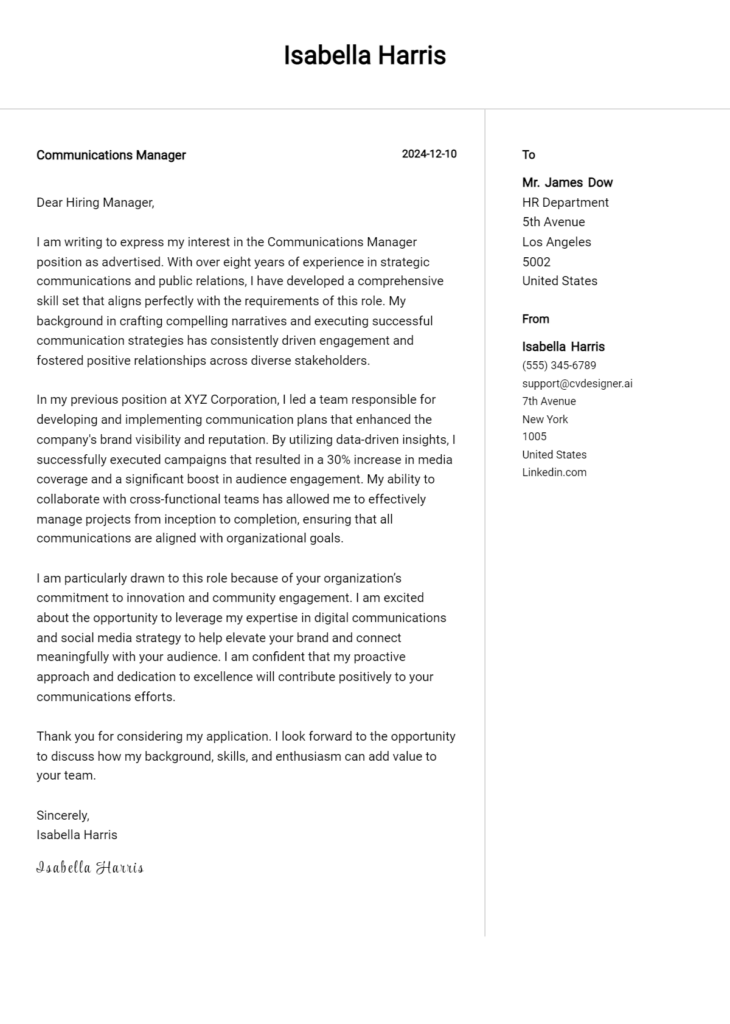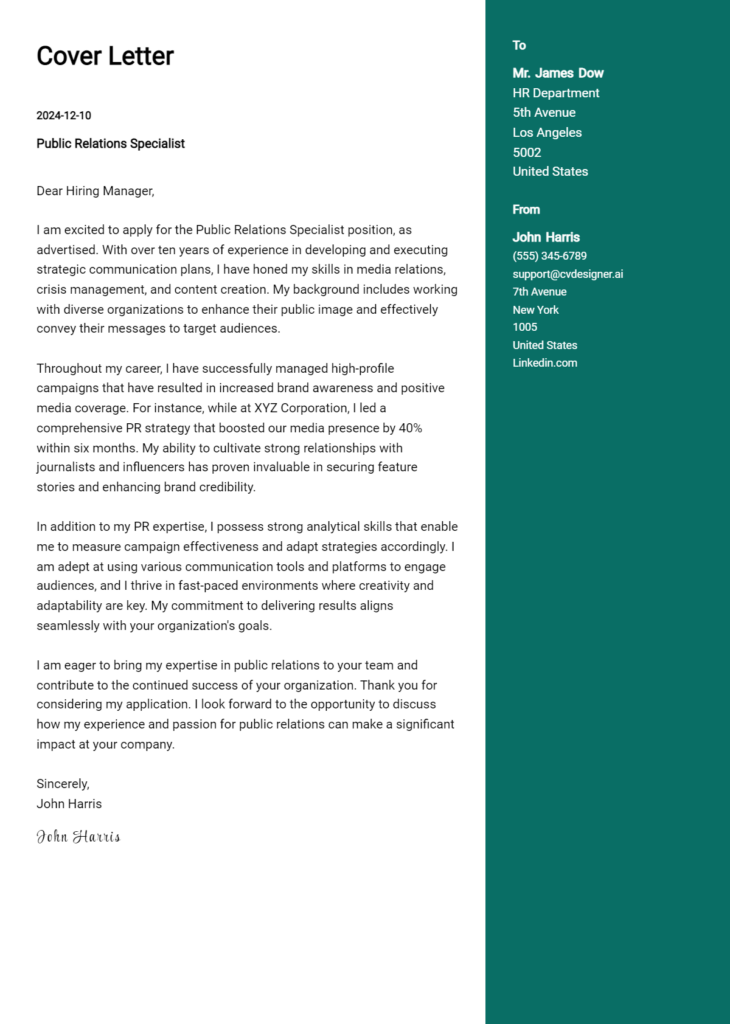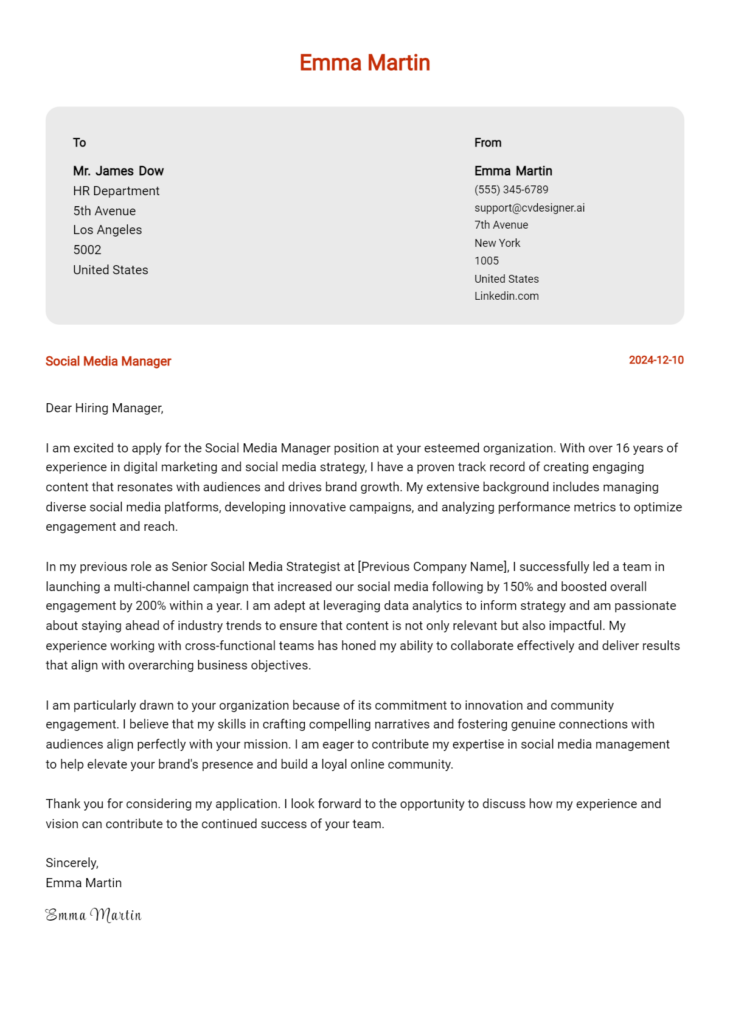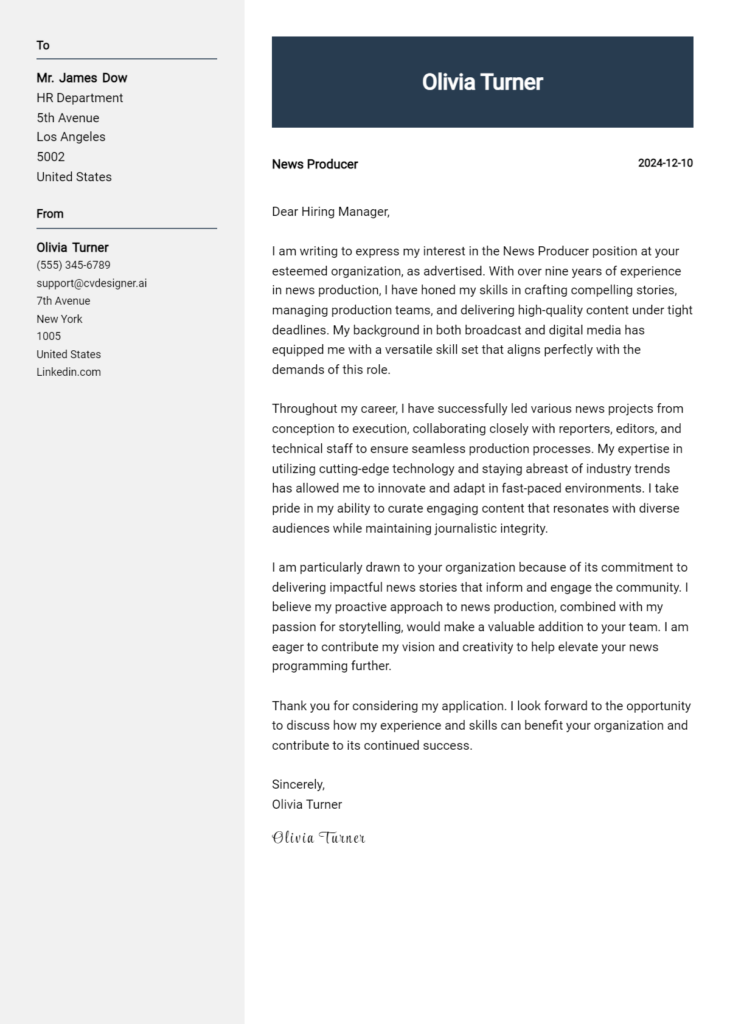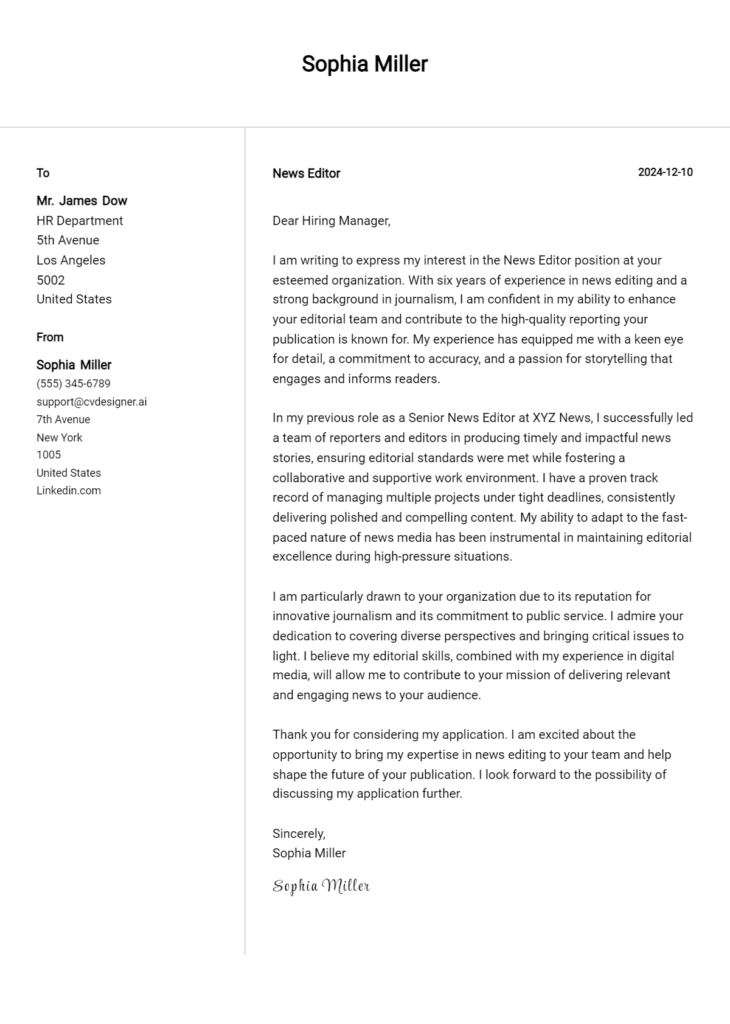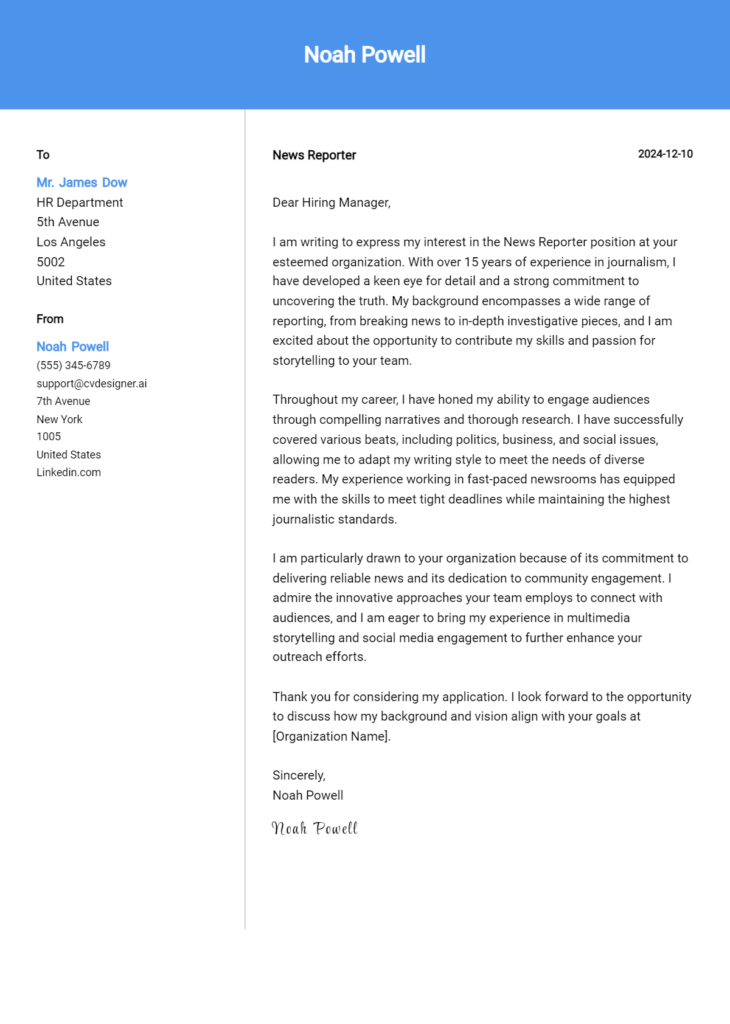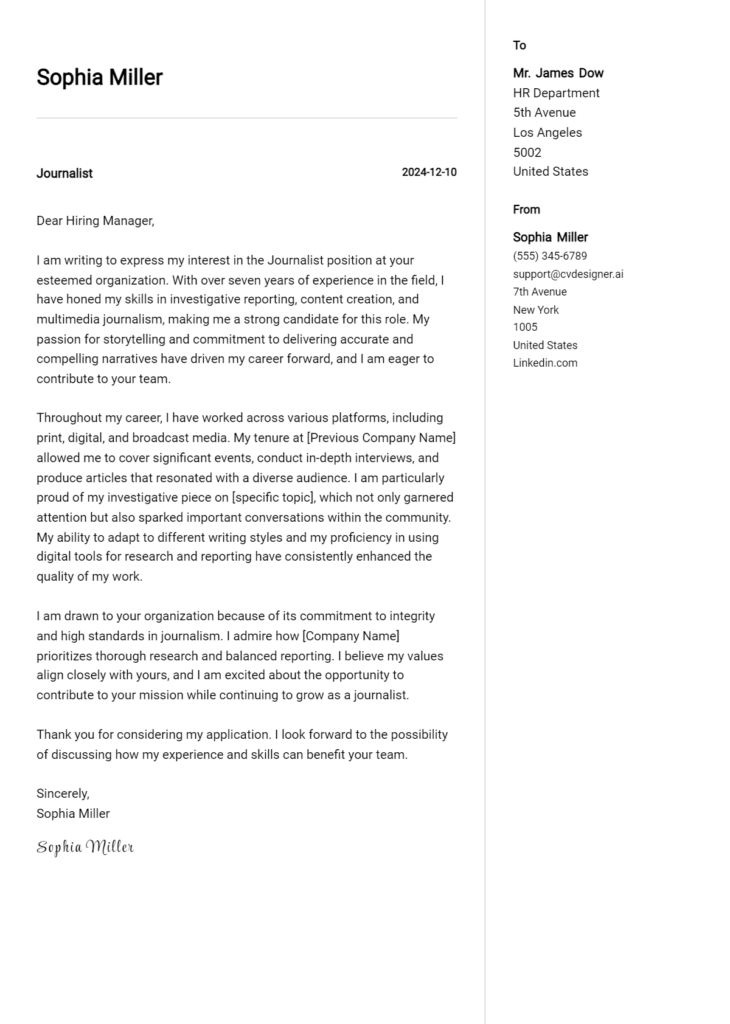Broadcast Journalist Cover Letter Examples
Explore additional Broadcast Journalist cover letter samples and guides and see what works for your level of experience or role.
How to Format a Broadcast Journalist Cover Letter?
Crafting a compelling cover letter is essential for a Broadcast Journalist, as it serves as your first opportunity to make a lasting impression on potential employers. The way you format your cover letter not only showcases your professionalism but also reflects your communication skills—critical attributes for anyone in the media industry. A well-structured cover letter captures the hiring manager's attention and demonstrates your ability to convey information clearly and effectively.
In this guide, we will explore how to format your cover letter, providing you with the tools to create a standout application.
We will focus on the essential components of a professional cover letter, including:
- Cover Letter Header
- Cover Letter Greeting
- Cover Letter Introduction
- Cover Letter Body
- Cover Letter Closing
Each section is crucial for presenting your qualifications and enthusiasm for the role. Let’s delve into each part to ensure your cover letter resonates with potential employers in the broadcast journalism field.
Importance of the Cover Letter Header for a Broadcast Journalist
A well-structured cover letter header is crucial for a Broadcast Journalist as it establishes professionalism and clarity from the very first glance. The header should include essential contact information, the date of the application, and the recipient's details. This not only helps in identifying the applicant and their intent but also ensures that the letter reaches the right person. A clear and professional header reflects the attention to detail that is vital in the journalism field, setting a positive tone for the rest of the application.
Here are examples of a strong and weak cover letter header:
Strong Example
John Doe 123 News Street City, State, ZIP Code johndoe@email.com (123) 456-7890 October 10, 2023 Ms. Jane Smith Head of News ABC News Network 456 Broadcast Avenue City, State, ZIP Code
Weak Example
John johndoe@email Oct 10 Hey, ABC News
The Importance of a Strong Cover Letter Greeting for Broadcast Journalists
A well-crafted cover letter greeting serves as the opening statement of your application, setting the tone for the rest of your letter. It demonstrates your professionalism and shows that you have taken the time to personalize your communication by addressing the hiring manager directly. A thoughtful greeting can create a positive first impression, while a generic one may suggest a lack of interest or effort. To make your greeting stand out, avoid using phrases like “To Whom It May Concern” or “Dear Hiring Manager.” Instead, take the time to research the recipient’s name, which can often be found on the company’s website or LinkedIn profile. This small effort can significantly enhance your application.
Strong Greeting Example
Dear Ms. Johnson,
Weak Greeting Example
To Whom It May Concern,
The Importance of a Well-Crafted Cover Letter Introduction for a Broadcast Journalist
A well-crafted cover letter introduction is crucial for a Broadcast Journalist as it serves as the first impression on the hiring manager. This introduction should not only capture their attention but also express genuine interest in the role while briefly showcasing relevant skills or notable achievements. An effective introduction sets the tone for the rest of the cover letter, compelling the reader to continue exploring the candidate's qualifications. Below are strong and weak examples that illustrate the difference between a captivating introduction and a lackluster one.
Strong Example
Dear [Hiring Manager's Name], As a passionate Broadcast Journalist with over five years of experience in delivering compelling stories for both radio and television, I was excited to discover the opening at [Company Name]. My work has not only been recognized with multiple awards, including the [specific award], but has also allowed me to connect with diverse communities and bring their stories to light. I am eager to bring my expertise in investigative reporting and storytelling to your esteemed team.
Weak Example
To whom it may concern, I am writing to apply for the Broadcast Journalist position. I have some experience in journalism, and I think it could be a good fit for me. I hope you will consider my application.
Purpose of the Cover Letter Body for a Broadcast Journalist
The cover letter body for a Broadcast Journalist serves as a crucial platform for candidates to convey their unique skills, relevant experiences, and overall value to the prospective employer. It allows applicants to highlight specific projects and accomplishments that showcase their ability to produce compelling content, conduct insightful interviews, and engage audiences effectively. By detailing past experiences, such as award-winning reports or impactful documentary features, candidates can demonstrate their capability to contribute meaningfully to the organization's objectives. Additionally, the cover letter provides an opportunity to express passion for journalism and a strong understanding of the industry's evolving landscape, thereby setting the tone for a potential interview.
Strong Example
Dear [Hiring Manager's Name], I am excited to apply for the Broadcast Journalist position at [Company Name]. With over five years of experience in investigative reporting and a proven track record of producing award-winning news segments, I am confident in my ability to contribute significantly to your team. At [Previous Company], I led a team that uncovered a local corruption scandal, resulting in significant policy changes and increased community engagement. My ability to connect with sources and convey complex stories in an accessible manner has earned me accolades, including the [Specific Award]. I am eager to bring my storytelling skills and dedication to impactful journalism to [Company Name], where I believe my background aligns perfectly with your mission of delivering high-quality news coverage. Sincerely, [Your Name]
Weak Example
Dear [Hiring Manager's Name], I want to apply for the Broadcast Journalist job at [Company Name]. I have worked in news for a while. I am good at writing and sometimes do interviews. I once covered a story about a local event, which was fine. I think I would be a decent fit for your team because I like journalism and want to work at a big company like yours. Thank you for considering me. Best, [Your Name]
Importance of Cover Letter Closing for a Broadcast Journalist
The closing paragraph of a cover letter is crucial for a Broadcast Journalist, as it serves to summarize key qualifications, reiterate enthusiasm for the role, and encourage the hiring manager to take the next steps, such as reviewing the attached resume or scheduling an interview. A strong closing can leave a lasting impression and emphasize the applicant's fit for the role, while a weak closing may fail to convey confidence and enthusiasm, potentially diminishing the impact of the entire letter.
Strong Example
Thank you for considering my application for the Broadcast Journalist position at [Company Name]. With my extensive experience in investigative reporting and my passion for uncovering stories that matter, I am excited about the opportunity to contribute to your team. I look forward to the possibility of discussing my application further and am available for an interview at your earliest convenience. Please find my resume attached for your review.
Weak Example
I hope you think about my application. I’m not sure if I’m the best fit, but I would like to work at [Company Name]. If you want to discuss this further, you can call me or something.
Crafting an effective cover letter is essential for aspiring Broadcast Journalists to stand out in a competitive field. This document not only reflects your technical skills and creativity but also highlights your problem-solving abilities, knowledge of the Software Development Life Cycle (SDLC), teamwork experience, and passion for continuous learning. Here are some tips to help you create a compelling cover letter that can capture the attention of hiring managers.
Tips for Writing a Cover Letter as a Broadcast Journalist
Showcase Your Technical Skills
Highlight the specific technical skills that are relevant to broadcast journalism, such as proficiency in video editing software, audio production tools, or knowledge of broadcast equipment. Provide examples of how you have used these skills in your previous work or projects. This not only demonstrates your competency but also your readiness to tackle the technical demands of the role.Emphasize Problem-Solving Abilities
Broadcast journalism often requires quick thinking and effective problem-solving under pressure. Share an experience where you successfully navigated a challenging situation, whether it was during a live broadcast or while working on a tight deadline. Describe the problem, your approach to finding a solution, and the positive outcome that resulted.Demonstrate SDLC Knowledge
Understanding the Software Development Life Cycle can be beneficial, especially if you are involved in digital journalism. Highlight any experience you have with planning, executing, and evaluating projects in a structured manner. Discuss how this knowledge helps you produce better content and manage projects more effectively.Highlight Teamwork Experience
Broadcast journalism is rarely a solo endeavor. Use your cover letter to illustrate your ability to work collaboratively with producers, camera operators, and other journalists. Provide specific examples of successful team projects or experiences that highlight your communication skills and ability to contribute positively to a team environment.Convey a Passion for Continuous Learning
The media landscape is constantly evolving, and a commitment to continuous learning is crucial. Mention any relevant courses, workshops, or certifications you have pursued to enhance your skills. Additionally, express your enthusiasm for staying updated with industry trends and your desire to grow within the field.
By incorporating these tips into your cover letter, you can effectively convey your qualifications and passion for broadcast journalism, making a strong impression on potential employers. For additional resources, consider exploring cover letter templates or utilizing a cover letter builder to streamline your writing process.
Common Mistakes to Avoid in a Broadcast Journalist Cover Letter
Crafting a compelling cover letter is vital for standing out in the competitive field of broadcast journalism. Avoiding common pitfalls can significantly enhance your chances of making a positive impression on hiring managers. Here are some mistakes to steer clear of:
Generic Greetings: Using "To Whom It May Concern" can come off as impersonal. Instead, address the letter to a specific person when possible.
Lack of Research: Failing to tailor your letter to the specific station or role can make it seem like you’re sending a mass application. Research the station's ethos and recent projects to personalize your content.
Overly Long Letters: Keeping your cover letter concise is essential. Aim for a length of one page, focusing on your most relevant experiences and skills.
Neglecting to Showcase Your Skills: Not highlighting your unique qualifications, such as on-air experience or special reporting skills, can lessen your impact. Use specific examples to illustrate your expertise.
Typos and Grammatical Errors: A cover letter filled with mistakes can undermine your professionalism. Always proofread your letter or ask someone else to review it before sending.
Failing to Include a Call to Action: Not expressing your eagerness for an interview can leave a weak impression. Conclude your letter by inviting further conversation about your candidacy.
Ignoring Formatting Guidelines: A poorly formatted letter can detract from your message. Familiarize yourself with cover letter format best practices to ensure clarity and readability.
For more insights, you can explore cover letter examples that can guide you in crafting an effective narrative that resonates with your potential employer.
Cover Letter FAQs for Broadcast Journalist
What should I include in my cover letter as a Broadcast Journalist?
In your cover letter, highlight your relevant experience in journalism, emphasizing your skills in research, interviewing, and storytelling. Mention specific roles or projects that showcase your ability to produce compelling content. Include your familiarity with various media platforms, including television, radio, and digital. It’s also important to convey your passion for journalism, your understanding of the news cycle, and your ability to work under tight deadlines. Don’t forget to tailor your cover letter to the specific job and the organization, showcasing your knowledge of their mission and values.
How can I demonstrate my storytelling skills in my cover letter?
To demonstrate your storytelling skills, include a brief anecdote or example from your work history that illustrates a successful story you covered. Describe the challenges you faced, the approach you took, and the impact of your reporting. Use vivid language to make your story engaging, showing your ability to connect with audiences. You might also mention any awards or recognition you've received for your storytelling efforts. This will not only showcase your skills but also your enthusiasm for journalism and your commitment to producing high-quality content.
How long should my cover letter be?
A cover letter for a Broadcast Journalist position should ideally be one page long, consisting of three to four paragraphs. This length allows you to convey your qualifications and enthusiasm without overwhelming the reader. Keep your paragraphs concise, focusing on your most relevant experiences and skills. Aim for clarity and impact in your writing, ensuring that every sentence adds value to your application. Remember to use a professional tone and format, and don’t forget to proofread for any grammatical errors or typos that could detract from your professionalism.
Should I address my cover letter to a specific person?
Whenever possible, addressing your cover letter to a specific person is highly recommended. It shows that you have done your research and are genuinely interested in the position. If the job posting doesn’t provide a name, consider searching the company’s website or calling their office to inquire. If you can’t find a specific name, use a general greeting such as “Dear Hiring Manager.” Avoid using outdated terms like "To Whom It May Concern," as this can come across as impersonal. A personalized greeting sets a positive tone and demonstrates your attention to detail.
Build your Cover Letter in minutes
Use an AI-powered cover letter builder and have your letter done in 5 minutes. Just select your template and our software will guide you through the process.

